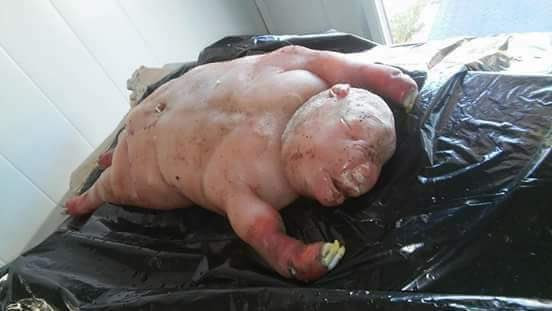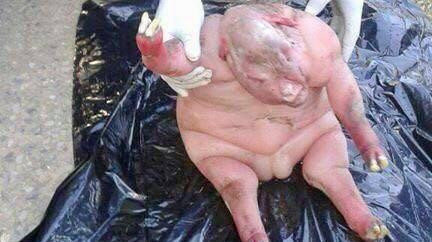Villagers suspect bestiality after 'half human, half lamb' is born to ewe
Authorities assured locals the deformed lamb was "not a progeny of sheep ovum and a human sperm".

South African authorities have moved to calm villagers after a ewe gave birth to a deformed lamb, which appeared to be 'half human', sparking fears it was the product of bestiality.
Many of the 4,000 inhabitants of Lady Frere, Eastern Province, were spooked by the stillborn specimen that looked bizarrely human, despite having hooves.
On Wednesday, the Eastern Cape Department of Rural Development and Agrarian Reform gave a statement to reassure locals who thought the creature was the product of something sinister.
"We call on the local community not to panic over this deformed lamb. We can confirm that this deformed lamb is not a progeny of sheep ovum and a human sperm," said Chief Director of Veterinary Services, Dr Lubabalo Mrwebi.
Mrwebi acknowledged that the animal "at a glance resembles a human form" but stressed that it had been "sired by a sheep and was subsequently infected by a Rift Valley Fever at early stage of its pregnancy".
The shocking photos have gone viral on social media with even the most scientifically minded of users admitting that the lamb has the appearance of being part human.
Its pink, hairless body and rounded head is uncannily anthropomorphic. The terror is compounded by the fact that, despite being dead, it wears an expression of agony.

Mrwebi was keen to educate the local population about the impossibility of a ewe bearing a man's child, saying: "It is worth noting that a sheep has 28 pairs of chromosomes; a goat has 30 pairs; while humans have 23 pairs.
"These facts are important in dispelling the myth that a union of a sheep ovum and a human sperm can lead to a development of a viable life form. The deformed lamb exhibits signs that are consistent with an early foetal development that went wrong as a result of a viral infection," he added.
The department will conduct a postmortem and announce the results in due course.
"The lesson we are learning from this experience is that small stock farmers must keep their animals protected against diseases like the Rift Valley Fever with a correct vaccine, which is best given long before the mating season so that by the time the females get pregnant they are already protected against this disease," Mrwebi said.
© Copyright IBTimes 2025. All rights reserved.





















